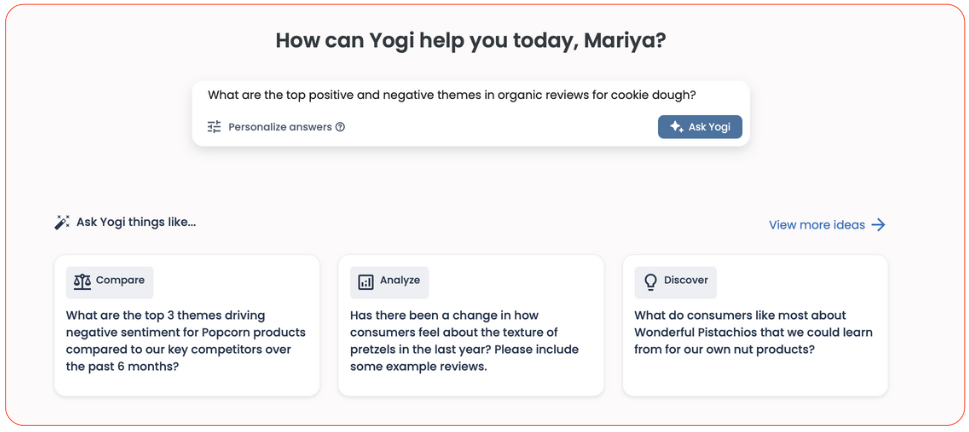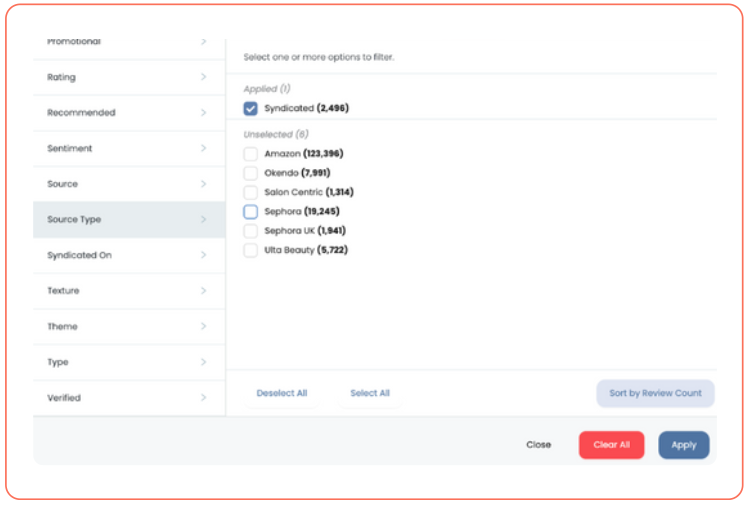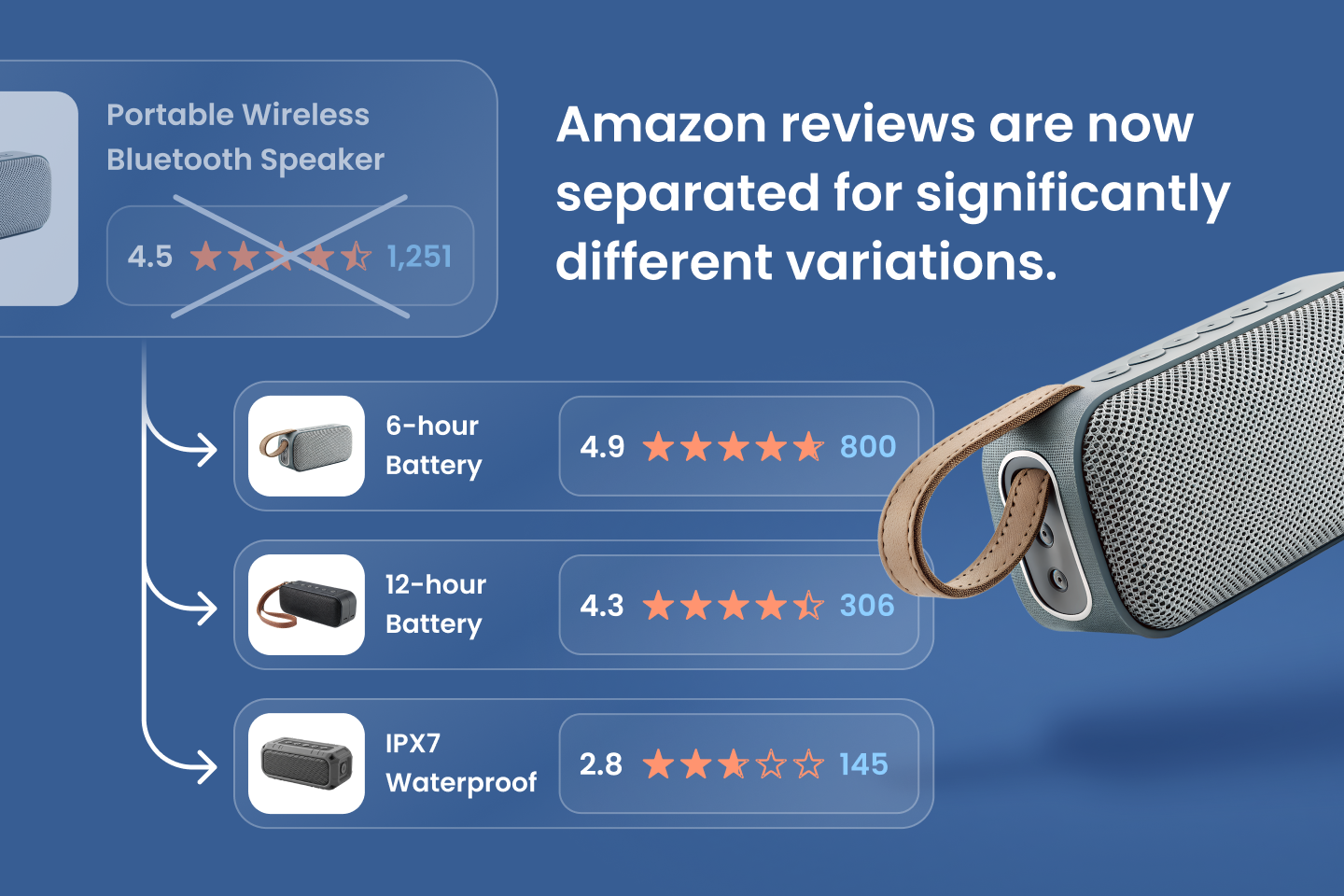Syndicated Reviews What They Are, Why They Matter, and How Yogi Handles Them

What Are Syndicated Reviews?
Syndicated reviews are consumer-generated reviews originally posted on an “owned” platform—such as a brand’s website, or a promotional program like Influenster—and then redistributed to multiple retailer sites through review syndication networks such as Bazaarvoice or PowerReviews. This means the same review can appear in many places at once, giving consumers helpful context but complicating analytics.
Here's an example of syndication: the same review appearing across multiple retailer sites.

Why Syndicated Reviews Exist
Brands and retailers use review syndication to:
- Populate PDPs quickly and avoid launching with zero reviews on retailer sites
- Build trust by leveraging proven consumer experiences from other platforms
- Accelerate SKU rollouts across multiple retailers
- Maintain consistent brand sentiment and messaging across environments
The Challenge: Distortion in Review Analytics
While syndication improves the consumer experience, it introduces challenges when aggregating data for analysis:
- Overcounting reviews: A single review may appear on 10 or more retailer sites. Without proper handling, this artificially inflates review volume.
- Skewed sentiment: Repeated reviews can overweight certain opinions and distort trends (e.g. a single negative review complaining about taste can be counted multiple times if not properly deduplicated).
- Retailer blind spots: Syndicated reviews mix with organic ones, making it difficult to isolate site-specific issues like fulfillment or packaging complaints.
- Promotional review noise: Syndicated reviews are often generated as part of promotional campaigns, where participants receive free products or other incentives in exchange for writing a review. This can lead to an overrepresentation of 5-star ratings and overly positive sentiment, even when the reviews include critical feedback. To ensure accurate and trustworthy insights, it's essential to identify and filter out these reviews during feedback analysis.
Misleading competitor benchmarks: Brands with more syndicated or promotional reviews may appear to outperform competitors in sentiment or volume, even if the reviews don't reflect real-world product perception. This makes true side-by-side comparisons unreliable without normalization.
How Yogi Handles Syndicated Reviews
Since Yogi’s goal is to give you the most accurate view of your product’s sentiment, its platform was built to handle the complexities of review aggregation—including duplication and syndication—automatically and at scale.

Automatic Deduplication Across Retailers and SKUs
Yogi ensures that reviews syndicated across retailers or variant listings are only counted once. The platform identifies duplicates by analyzing:
- Syndication metadata
- Review title and body text
- Timing and language similarity
This ensures accurate counts of distinct reviews and representative sentiment without amplifying repeated feedback.
Syndication Attribution and Source-Specific Filtering
Yogi attributes each review to its original source and distinguishes syndicated content from retailer-native reviews. Retailer-level dashboards and analysis reflect only organic feedback from that site, enabling clean comparisons and trustworthy insight.

Promotional Review Identification, Even When Unlabeled
Yogi also uses a combination of natural language processing and AI modeling to detect promotional or incentivized reviews—even when not explicitly labeled by the retailer or syndication provider. The system identifies reviews containing language patterns that indicate:
- Receipt of free products
- Participation in sampling programs, including retailer programs like Amazon Vine
- Mentions of gifts, trials, or compensation
These reviews can be filtered and reviewed separately to maintain the integrity of sentiment analysis.
Here’s an example of a 5-star review that appears positive at first glance. While it isn’t explicitly tagged as incentivized, Yogi detects that it’s promotional based on language in the text. Yogi’s AI also understands not to misattribute the positive rating—accurately parsing phrase-level sentiment and recognizing that the reviewer is still expressing challenges with specific product attributes.

Why It Matters: Clarity at the Source
Syndicated and incentivized reviews are valuable to shoppers but can skew internal analysis if not properly managed. Yogi removes duplicative noise and surfaces only meaningful, distinct insights, so your team can:
- Trust distinct, unique review counts and sentiment trends
- Perform accurate benchmarking across competitors
- Understand true retailer-specific feedback
- Separate promotional from organic reviews with confidence and precision
The Yogi Advantage: Integrity at Every Step
- Deduplication across retailers and variant listings
- Review attribution to original sources
- Intelligent filtering of promotional content
- Automated processing for consistent, scalable clarity
Explore your brand’s review ecosystem—without the noise of duplication.
Unified Intelligence, Finally Within Reach
Ask Yogi cuts through silos and transforms scattered feedback into one continuous thread of truth—accessible to every team, whenever they need it.
It’s fast, defensible, and finally, actionable.
If you’ve ever wished for a way to get to the “why” behind your data without the delay—it’s here.
For a limited time, book a demo—and ask Yogi anything.





